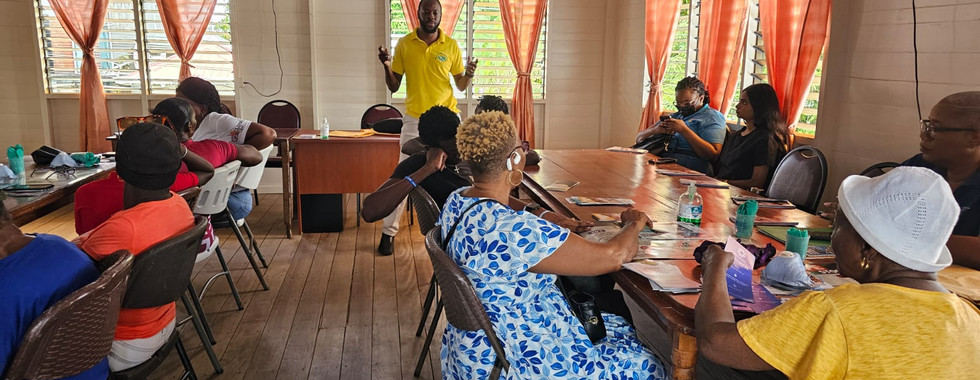Building Bridges in Agriculture: Central Mahaicony F2B Session Fuels New Market Connections
- KS & PC of Guyana Agri Connect
- Jul 17
- 3 min read
Updated: Jul 18
Overview
On July 16, 2025, the agricultural hub of Central Mahaicony came alive with purpose, energy, and progress during the first Farmer to Business (F2B) Session in Mahaicony and the second event of its kind held in Region 5. Under the theme “Opportunities in Agriculture through Innovation and Collaboration,” this session built on the momentum of the first, deepening impact and expanding the network of empowered farmers and engaged market actors.
Part of the broader Guyana Agri Connect initiative, the session wasn’t just another gathering—it was a bridge-building mission, closing the gap between hardworking farmers and the markets they aspire to reach.
Though several buyers were unable to attend due to competing priorities, the Tourism and Hospitality Association of Guyana (THAG) stepped in with commitment and creativity. Acting as an intermediary, THAG gathered valuable farmer information to share with its wide-reaching network of buyers in retail and hospitality, ensuring no opportunity was lost.
A Platform with Purpose
Guyana’s agricultural sector is brimming with potential, yet faces familiar barriers: fragmented buyer access, limited logistics support, and underutilized local supply chains. Meanwhile, many businesses—especially in hospitality and food retail—are eager for high-quality, locally sourced produce.
The Central Mahaicony F2B session was designed to bridge this divide. Unlike traditional meetings, it emphasized innovation, collaboration, and actionable connection-making, giving farmers not just inspiration but real tools and next steps.
Unified Commitment from Key Partners
The event, organized by the Georgetown Chamber of Commerce and Industry in partnership with WUSC through the Sustainable Agriculture in the Caribbean (SAC) Project, demonstrated a united commitment from key partners across both public and private sectors. It brought together a strong network of national stakeholders and private sector champions, including the National Agricultural Research and Extension Institute (NAREI), Guyana Marketing Corporation, Small Business Bureau, Government Analyst – Food and Drug Department, Guyana Food Safety Authority, and the Pesticides and Toxic Chemicals Control Board (PTCCB). The Tourism and Hospitality Association of Guyana (THAG) also played a central role.
Private sector supporters, including Guyana Bank for Trade and Industry (GBTI) and Nijiro Inc., participated, emphasizing the importance of public-private partnerships in transforming the agri-business landscape.
THAG played a key role in collecting detailed farmer profiles and actively sharing them with relevant companies in its hospitality network. This strategic effort helped create market linkage opportunities that could expand far beyond the session itself.
Additionally, the PTCCB led an essential discussion on the safe use, storage, and disposal of pesticides—an important topic for both farmer and consumer safety. As a practical step to enhance farm safety, four farmers received pesticide storage cabinets through a raffle system—an initiative supported by WUSC with funding from Global Affairs Canada (GAC).
Spotlight: From Local Market to Niche Opportunity
One of the most promising stories emerging from the Central Mahaicony F2B Session is that of a female livestock farmer who has been quietly building a reputation in her community for producing high-quality, free-range chicken. Her operations are small but intentional, grounded in ethical farming practices, natural feed, and care for animal welfare. Until now, she sold exclusively within her village, limited by market access and exposure, despite growing interest from customers who value clean, local, and sustainable meat.
At the F2B session, a one-on-one consultation with THAG changed her trajectory. THAG immediately saw her potential to supply a niche market segment, hotels and restaurants looking for exactly the kind of story-rich, traceable product she offers. The association collected her business profile and committed to sharing it with its network of buyers. For her, this moment was more than encouraging; it was a shift from being “just a local farmer” to being seen as a potential premium supplier. It’s a reminder that small farms, when given the right exposure, can fill big gaps in a growing, values-driven food economy.
Inclusion, Engagement, and Impact
The session reflected the diverse face of Guyanese agriculture, with strong participation from women, youth, and male farmers alike. Through lively breakout discussions and practical exchanges with agencies and businesses, farmers explored solutions to challenges like financing, packaging, and food safety compliance.
Attendees left more than informed; they left empowered, with fresh perspectives, meaningful connections, and tangible next steps. And above all, they left with hope—hope that change is not only possible, but already underway.
Looking Ahead: From Session to Movement
The Central Mahaicony F2B Session wasn’t just an event—it was a moment of transformation. As the second session hosted in Region 5, it represents a growing and sustainable movement to connect Guyana’s farmers with the markets they need to thrive.
With Guyana Agri Connect at the helm and partners like THAG stepping in to ensure momentum doesn’t stall, the future of agriculture in Region 5 looks brighter, more connected, and more resilient.
And for that free-range chicken farmer in Mahaicony? It may well have been the beginning of something much bigger.








































Comments